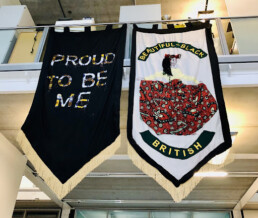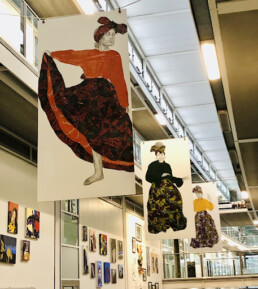A guest blog by Madeleine Fresko-Brown.
There’s a lot of negativity in discourse around education at the moment. Times are tough, and it can be hard to work in a system you know is not working well for every child or every adult involved. But it is possible to be happy in this job!
Just in case anyone was doubting, it is possible to work in a comprehensive secondary school in the UK in 2022 and be really happy 😊 #edutwitter @thosethatcan
— Madeleine X F-B (@M_X_F) November 1, 2022
I’m a new vice principal of a large, busy inner London secondary academy. Here are some of the things which give me satisfaction, fulfilment, and yes, happiness at work.

1. Walking into my school and taking in the excellent student art adorning the walls and the high spaces. Our art department scored in the top 1% in the country for the UAL extended diploma, and you can see why! I brought my family (both my parents and my children) to the art show because I wanted to show it off – not that it had anything to do with me at all. But how lucky am I to work in a place like this?

2. Morning gate duty. Seeing the faces of our year 7 & 8s in the morning, saying good morning with a smile, them politely saying good morning back. It’s always good to be able to connect with some of the ‘trickier’ students in a positive way first thing, before anything has gone wrong
3. Line management meetings. Perhaps some groan at the prospect of these, but I really enjoy them! I meet with the principal (my line manager) and everyone I line manage weekly. It takes up a lot of time (2 almost full days of my timetable devoted to this) but it’s worth it. Having a good chunk of time with the principal means I can always run ideas by her, get her wisdom and the longer view of her experience of the school, as I am still quite new. Each person I line manage comes prepared with questions and things to discuss – sometimes small, sometimes big. As a teacher I am by nature interested in people’s development, be they adults or children, and I consider it a privilege to be part of my colleagues’ journeys as they work out how to do their jobs to the best of their ability, and reflect thoughtfully when things don’t quite go their way. Now I’m a Vice Principal, I am managing more senior colleagues (3 assistant principles, the SENDCO, and a Curriculum Area Lead) as well as meeting the DEI (Diversity, Equity & Inclusion) lead and Induction Tutor on a regular basis. As each of these people bring a wealth of experience to their roles, I always feel I have plenty to learn from them while coaching them to achieve their visions. This makes me happy.
4. Teaching! We tend to get less and less time in the classroom as we progress through senior leadership, which is necessary but can be sad. I very much enjoy the classroom time I do get- this year with year 11 and year 13. I always find the connection I have with pupils in my own classroom feels so much stronger than with pupils I only interact with on corridors. Once I’ve taught a child, even if only for a few weeks, I feel I ‘know’ them and they know me.
5. Learning walks/observations/lesson walkabouts. As a ‘teaching & learning’ person, I love popping into lessons the most. I wish I found more time for it but I make sure I do it informally once a week and offer positive praise on a postcard. I even popped into some senior colleagues this week who seemed to quite like receiving a postcard themselves! Longer, more formal observations are also really enjoyable, as are the feedback conversations afterwards where colleagues show a genuine desire to reflect and improve.
6. Coaching. Every teacher in this school has a period allocated for coaching, and every member of support staff also has peer coaching as part of their CPD programme. It’s pretty amazing. I am paired with the other VP for coaching and it’s a great space to be able to come together and listen to each other. We’ve been trained on a couple of models and we don’t always manage to stick to them religiously, but the space is there and we both know it’s for listening, probing, and developing, which at different points has helped us both a lot. We also adopt a coaching approach in our line management meetings, which avoids the feeling of coming out of a meeting feeling like you’ve been told what to do.
7. Weekly Teaching & Learning meeting with middle leaders. Every week the senior leaders responsible for teaching & learning, curriculum directors and curriculum area leaders (CALS) meet to discuss our priorities, progress, next steps, feedback and more. I enjoy chairing these meetings. The directors and CALS are a thoughtful and honest bunch, and help keep the senior team in check, lest we suggest something that has been tried and failed before, or would be an unreasonable workload burden. As well as giving us valuable feedback, I hope the middle leaders feel that the meetings help them to develop, both in their understanding of whole school considerations, and in thinking through strategy for their own departments in collaboration with others.
8. I love leading CPD, facilitating others to lead, and the feedback from colleagues. At a recent short CPD session entitled ‘every minute counts,’ I invited several colleagues to share tips for saving minutes in a lesson. Suggestions included using stopwatches on the board, carefully numbering books and chairs and handing them out in a perfect order, the importance of a teacher being silent during the silent Do Now, modelling using a visualiser, mini whiteboard AfL, and more. I gained happiness from seeing how thoughtful and effective my colleagues are when they really think about their practice. Leading DEI (Diversity, Equity, Inclusion) CPD on LGBTQ+ inclusion with a colleague was also a very memorable moment from which I came out buzzing. One colleague bravely shared his experiences of transitioning, and everyone engaged so thoughtfully with scripts we had prepared on how to respond to certain comments/situations.
9. I like the structure and routines of our leadership meetings: we have a ‘rolling chair’ so each member of the team has the experience of chairing (mainly preparing the agenda, timekeeping and the important role of bringing snacks!) We always start with an ‘opening round’ of something positive from our week – often bringing lots of shout outs for colleagues, and ‘something educational’ where the chair brings something for us to read/watch/discuss and learn from. I appreciate that we prioritise continual professional development for our team through this routine. My colleague and I also deliver extra DEI training to the SLT on a regular basis, which is a rewarding and enjoyable experience.
10. Going home. Yes I love my job and I also love leaving it at the end of a day! On Mondays, I prioritise my physical and mental wellbeing by going to yoga (in school as part of the wellbeing offer) and then a gym class. On Tuesdays I leave late because of leadership meetings (finishing at 6.15. At my first school, SLT would regularly be in school until 7.30pm and later). Other days I leave at a reasonable time and take my 2 kids to their swimming lesson or pick them up from after school club. Evenings I’ll often work, and often until quite late (10.30pm is not unusual) but given I only start this after the kids are in bed and I’ve eaten, this doesn’t feel unreasonable. I get my most productive work (and almost all my lesson planning) done in the evening as there are fewer interruptions. Although I do need to work most evenings, I won’t turn down a social arrangement if the opportunity arises. Last week I went to dinner with a friend and next week I’m going to the theatre. The work will get done at some point!
That concludes my round up of the things that make up the main chunks of my time as a happy senior leader. I haven’t mentioned small but important things: little conversations, smiles, or sympathetic looks exchanged with colleagues, which remind me that we’re in this together and working towards the same goal. The way a year team leader or assistant year team leader will step in to help if I’m struggling to get through to a student. Getting to know support staff, some of whom have been at the school for over 20 years and really seen it all! Interviewing year 6 students joining us next year, or year 8 students selecting their options, meeting parents and carers at parents’ evening and open evening. Seeing SEND students looking after the two chickens we adopted, reading the school newsletter and attempting to process the vast number of things that happen in this institution, watching the students play a sports match (I haven’t done enough of this yet). Welcoming year 5 and 6 students for science workshops, arts days, sports events, watching the school production, the staff panto, the student band who practise in a science lab with their trombone, trumpet and flute! I could go on.
As for challenges? Yes they exist. My school has been through some major tragedies and should one of these occur while I’m in post, no doubt it will be an incredibly difficult time. But when it comes to smaller, ‘everyday’ challenges, much of happiness comes down to mindset and I find myself in a mindset where a challenge is a learning opportunity, not something to stress over. There are never enough hours in the day, no matter what your position in a school. I prioritise things that affect other people (colleagues, students, parents) and things I know I will be held accountable for. At times I wish I was doing more, but I know my limits and know that sustainability is important for me and my colleagues.
Above all, knowing I’m in a place with people who have the same goals as me – to do the very best for the young people in our care, to help them make the best progress they can and secure sparkling futures – is what makes the difference, and what keeps me smiling (almost) every day.

